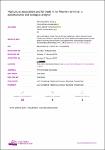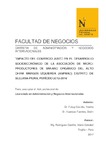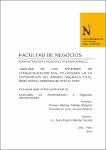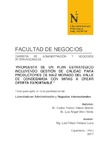Mostrar el registro sencillo del ítem
Agricultural associations and fair trade in the Peruvian rainforest: a socioeconomic and ecological analysis
| dc.contributor.author | Barro Chale, Alexandra | |
| dc.contributor.author | Rivera Castañeda, Patricia | |
| dc.contributor.author | Ramos Cavero, Maria Jeanett | |
| dc.contributor.author | Cordova Buiza, Franklin | |
| dc.date.accessioned | 2023-10-19T18:50:58Z | |
| dc.date.available | 2023-10-19T18:50:58Z | |
| dc.date.issued | 2023-03-16 | |
| dc.identifier.citation | Barro, A., Rivera, P., Ramos, M., & Cordova, F. (2023). Agricultural associations and fair trade in the Peruvian rainforest: a socioeconomic and ecological analysis. Environmental Economics, 14, 24-35. http://dx.doi.org/10.21511/ee.14(1).2023.03 | es_PE |
| dc.identifier.other | . | es_PE |
| dc.identifier.uri | https://hdl.handle.net/11537/34663 | |
| dc.description.abstract | Fair trade initiatives represent an essential support for the scarce opportunities that have arisen in the agricultural sector, as they cover various areas that contribute to increasing good trade practices. It is essential to highlight the contribution of fair trade in urban and rural areas, as it becomes a valuable incentive for differentiation. The main objective of this study was to determine how Fair Trade is applied in the socioeconomic and ecological sphere in an association of sustainable agricultural producers in the Peruvian jungle. This is quantitative research with a non-experimental crosssectional design. The survey technique was used, and a questionnaire was applied to 99 agricultural producers in the Amazon region of northern Peru, because it would help to analyze the new challenges of fair trade. In addition, data analysis and processing was carried out with Microsoft Office Excel and SPSS. The results show that 51% of the producers surveyed have been sensitized to adopt socially responsible actions aimed at strengthening sustainable development, social responsibility and good practices for fair trade in favor of the preservation of the resources of the Peruvian Amazon, as well as the socioeconomic development of farmers and the region itself. Forty-seven percent carry out social responsibility activities under the guidance of the Fairtrade organization, which has accompanied farmers to obtain Fairtrade certification. In addition, 59% of respondents say that they engage in healthy competition that generates trust among farmers. Fairtrade enables associated farmers to improve their ethical behavior and respect for their rights as well as those of the entire community. | es_PE |
| dc.format | application/pdf | es_PE |
| dc.language.iso | eng | es_PE |
| dc.publisher | LLC CPC Business Perspectives | es_PE |
| dc.rights | info:eu-repo/semantics/openAccess | es_PE |
| dc.rights.uri | https://creativecommons.org/licenses/by-nc-sa/4.0/ | * |
| dc.source | Universidad Privada del Norte | es_PE |
| dc.source | Repositorio Institucional - UPN | es_PE |
| dc.subject | Economic development | es_PE |
| dc.subject | Corporate social responsibility | es_PE |
| dc.subject | Agricultural producers | es_PE |
| dc.subject | Environmental footprint | es_PE |
| dc.subject | Environmental impact | es_PE |
| dc.title | Agricultural associations and fair trade in the Peruvian rainforest: a socioeconomic and ecological analysis | es_PE |
| dc.type | info:eu-repo/semantics/article | es_PE |
| dc.publisher.country | PE | es_PE |
| dc.identifier.journal | Environmental Economics | es_PE |
| dc.description.peer-review | Artículo científico | es_PE |
| dc.subject.ocde | https://purl.org/pe-repo/ocde/ford#5.02.01 | es_PE |
| dc.description.sede | Breña | es_PE |
| dc.identifier.doi | http://dx.doi.org/10.21511/ee.14(1).2023.03 |







